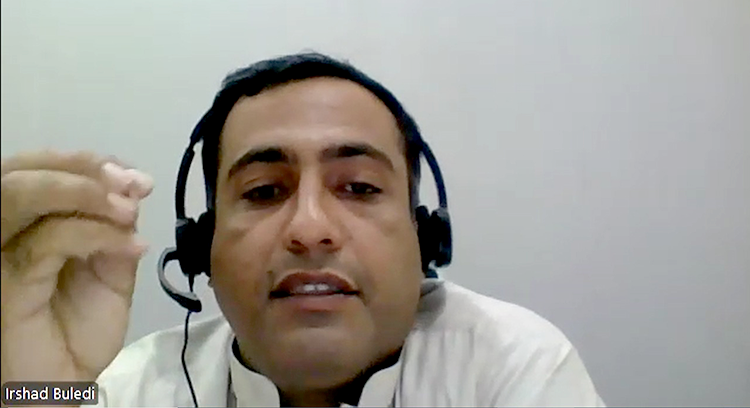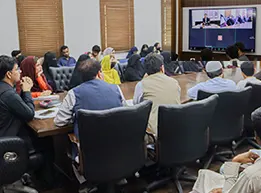CPEC STUDY CENTRE THE UNIVERSITY OF GWADAR ORGANIZED ONE DAY ONLINE SEMINAR ON “ CPEC & TOURISM IN PAKISTAN.
- 06 May, 2024
The CPEC Study Centre organized a virtual seminar on the topic “CHINA PAKISTAN ECONOMIC CORRIDOR AND TOURISM IN Pakistan: EXPLORING AND CAPITALIZING THE HIDDEN OPPORTUNITIES” at the University of Gwadar. Distinguished speakers at the event included Prof. Dr. Abdul Sattar, the Director of China Study Centre CSC, BUITMES, Quetta, Dr. Dost Muhammad Bareech, Lecturer, Department of International Relations at the University of Balochistan, Quetta, and Irshad Ahmed Buledi, director ORIC, UG. Naveed Razzaq lecturer at CPEC Study Centre moderated the event. A reasonable number of CPEC-related interested faculty and researchers from different universities in the country participated online.
The esteemed speakers shed light on the importance and role of the tourism sector in the development of Pakistan’s politics and economy under the larger framework of the China-Pakistan Economic Corridor (CPEC). Naveed Razzaq, who introduced the workings of the CPEC Study Center (CPECSC), University of Gwadar, to the guests and participants of the seminar formally started the program.
The first speaker of the seminar, Dr. Abdul Sattar, started his presentation by shedding light on the historical development of the tourism sector in the South Asian region. He further said that a national consensus on the development of the tourism sector has always been missing from our core policy-making institutions. Cases from the 1990s related to the tourism sector could not be translated into reality until 2010 because successive governments in these years prioritized personal projects by overlooking the decisions of their predecessors. Dr. Sattar further argued that the CPEC is not only for economic growth but also for the socio-economic development of Balochistan and Pakistan where the tourism sector exercises an immense worth. Infrastructural development and protection of the tourist sites in the western and eastern routes should be carry out by capitalizing CPEC efficiently. He further stressed that local investors and business community particularly in Balochistan and Gwadar must come up on the surface to invest locally for the promotion of the tourism sector.
The second speaker of the seminar was Dr. Dost Muhammad Bareech, who presented his paper, “Revival of Gandhara Civilization under CPEC." Dr. Dost started his presentation by highlighting the historical significance of the Gandhara civilization and the history of Buddhism in South Asia. He said that China’s soft power image is linked to its unique Buddhist diplomacy, and by effectively using this, China is becoming one of the major centers of tourism. He further said that the Gandhara site is not only important for China in terms of its religious importance, but there are some 27 country members of the ASEAN group following this religion who can visit Pakistan to visit their religious sites, which certainly can increase the number of tourists visiting Pakistan annually. Dr. Dost Muhammad additionally stressed that it is the ripe time for Pakistan to replicate the Chinese soft power image in its foreign policy by promoting religious harmony. In his talk, he appreciated the (ISSI) Institute of Strategic Studies Islamabad's efforts He emphasized that the coastal beach of Balochistan, which has unique islands like Astola, should be developed under the larger framework of the CPEC, and that Chinese models should be applied with full zeal and enthusiasm, which promoted Pakistan’s soft power image by inviting Buddhist monks to Pakistan and creating an environment of religious harmony.
Dr. Dost said that it is the era of narratives, so students, academia, and all the stakeholders must go hand in hand for the promotion of Pakistan’s soft power image.
Muhammad Irshad Buledi, Director of ORIC, UG, talked about the potential of Balochistan in terms of local tourism. He stressed that the coastal beach of Balochistan, which has unique islands like Astola, must be developed under the larger framework of the CPEC, and Chinese models must be applied with full zeal and enthusiasm.








